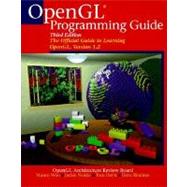
| What This Guide Contains | |
| What's New in This Edition | |
| What You Should Know Before Reading This Guide | |
| How to Obtain the Sample Code | |
| Nate Robins' OpenGL Tutors | |
| Errata | |
| Style Conventions | |
| Acknowledgments | |
| Figures | |
| Tables | |
| Examples | |
| Introduction to OpenGL | |
| What Is OpenGL? | |
| A Smidgen of OpenGL Code | |
| OpenGL Command Syntax | |
| OpenGL as a State Machine | |
| OpenGL Rendering Pipeline | |
| Display Lists | |
| Evaluators | |
| Per-Vertex Operations | |
| Primitive Assembly | |
| Pixel Operations | |
| Texture Assembly | |
| Rasterization | |
| Fragment Operations | |
| OpenGL-Related Libraries | |
| Include Files | |
| GLUT, the OpenGL Utility Toolkit | |
| Animation | |
| The Refresh That Pauses | |
| Motion = Redraw + Swap | |
| State Management and Drawing Geometric Objects | |
| A Drawing Survival Kit | |
| Clearing the Window | |
| Specifying a Color | |
| Forcing Completion of Drawing | |
| Coordinate System Survival Kit | |
| Describing Points, Lines, and Polygons | |
| What Are Points, Lines, and Polygons? | |
| Specifying Vertices | |
| OpenGL Geometric Drawing Primitives | |
| Basic State Management | |
| Displaying Points, Lines, and Polygons | |
| Point Details | |
| Line Details | |
| Polygon Details | |
| Normal Vectors | |
| Vertex Arrays | |
| Enabling Arrays | |
| Specifying Data for the Arrays | |
| Dereferencing and Rendering | |
| Interleaved Arrays | |
| Attribute Groups | |
| Some Hints for Building Polygonal Models of Surfaces | |
| An Example: Building an Icosahedron | |
| Viewing | |
| Overview: The Camera Analogy | |
| A Simple Example: Drawing a Cube | |
| General-Purpose Transformation Commands | |
| Viewing and Modeling Transformations | |
| Thinking about Transformations | |
| Modeling Transformations | |
| Viewing Transformations | |
| Projection Transformations | |
| Perspective Projection | |
| Orthographic Projection | |
| Viewing Volume Clipping | |
| Viewport Transformation | |
| Defining the Viewport | |
| The Transformed Depth Coordinate | |
| Troubleshooting Transformations | |
| Manipulating the Matrix Stacks | |
| The Modelview Matrix Stack | |
| The Projection Matrix Stack | |
| Additional Clipping Planes | |
| Examples of Composing Several Transformations | |
| Building a Solar System | |
| Building an Articulated Robot Arm | |
| Reversing or Mimicking Transformations | |
| Color | |
| Color Perception | |
| Computer Color | |
| RGBA versus Color-Index Mode | |
| RGBA Display Mode | |
| Color-Index Display Mode | |
| Choosing between RGBA and Color-Index Mode | |
| Changing between Display Modes | |
| Specifying a Color and a Shading Model | |
| Specifying a Color in RGBA Mode | |
| Specifying a Color in Color-Index Mode | |
| Specifying a Shading Model | |
| Lighting | |
| A Hidden-Surface Removal Survival Kit | |
| Real-World and OpenGL Lighting | |
| Ambient, Diffuse, Specular, and Emissive Light | |
| Material Colors | |
| RGB Values for Lights and Materials | |
| A Simple Example" | |
| Table of Contents provided by Publisher. All Rights Reserved. |
The New copy of this book will include any supplemental materials advertised. Please check the title of the book to determine if it should include any access cards, study guides, lab manuals, CDs, etc.
The Used, Rental and eBook copies of this book are not guaranteed to include any supplemental materials. Typically, only the book itself is included. This is true even if the title states it includes any access cards, study guides, lab manuals, CDs, etc.